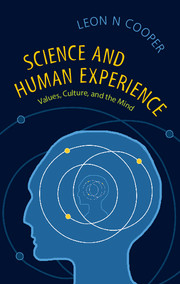Book contents
- Frontmatter
- Dedication
- Contents
- Preface
- Acknowledgement
- Part One Science and Society
- 1 Science and Human Experience: (Mephistopheles Is Alive and Well and Living in the Space Age)
- 2 Does Science Undermine our Values?
- 3 Can Science Serve Mankind?
- 4 Modern Science and Contemporary Discomfort: Metaphor and Reality
- 5 Faith and Science
- 6 Art and Science
- 7 Fraud in Science
- 8 Why Study Science? The Keys to the Cathedral
- 9 Is Evolution a Theory? A Modest Proposal
- 10 The Silence of the Second
- 11 Introduction to Copenhagen
- 12 The Unpaid Debt
- Part Two Thought and Consciousness
- Part Three On the Nature and Limits of Science
11 - Introduction to Copenhagen
from Part One - Science and Society
Published online by Cambridge University Press: 05 November 2014
- Frontmatter
- Dedication
- Contents
- Preface
- Acknowledgement
- Part One Science and Society
- 1 Science and Human Experience: (Mephistopheles Is Alive and Well and Living in the Space Age)
- 2 Does Science Undermine our Values?
- 3 Can Science Serve Mankind?
- 4 Modern Science and Contemporary Discomfort: Metaphor and Reality
- 5 Faith and Science
- 6 Art and Science
- 7 Fraud in Science
- 8 Why Study Science? The Keys to the Cathedral
- 9 Is Evolution a Theory? A Modest Proposal
- 10 The Silence of the Second
- 11 Introduction to Copenhagen
- 12 The Unpaid Debt
- Part Two Thought and Consciousness
- Part Three On the Nature and Limits of Science
Summary
In his play Copenhagen, Michael Frayn created a dramatic work with references to some of the most pressing issues in twentieth-century physics. But does knowledge of physics help in an understanding of the play?
This essay is based on program notes written for Trinity Repertory's production of the Michael Frayn play Copenhagen, directed by Oskar Eustis in December of 2002.
Of course Michael Frayn's Copenhagen is not about physics. It is about the memories and interactions of three important, passionate, figures struggling to make sense of a meeting that took place in Nazi-occupied Denmark in September of 1941. The question that dominates the play is why did Heisenberg, head of the German nuclear project, make that visit to Bohr, his old mentor, one of the creators of quantum theory and nuclear physics.
Since memory of the past is shaped by the present, and since each of the characters, particularly Heisenberg, has reasons of their own for wanting to reinterpret what their intentions were, we probably never can be sure what the actual reason for the visit was. (According to the quantum superposition principle, might it have been a combination of all of the various possibilities – all of the above, as the multiple-choice question puts it.)
But two of the three characters, Bohr and Heisenberg, happen to be among the founders of modern quantum theory – certainly one of the great intellectual achievements of the twentieth century.
- Type
- Chapter
- Information
- Science and Human ExperienceValues, Culture, and the Mind, pp. 76 - 78Publisher: Cambridge University PressPrint publication year: 2014



